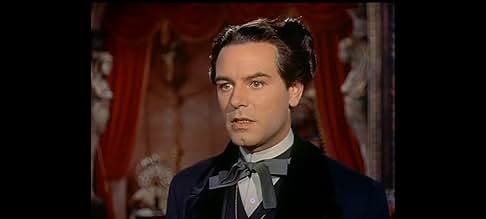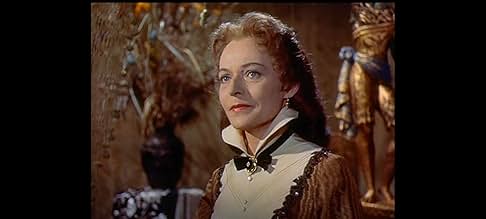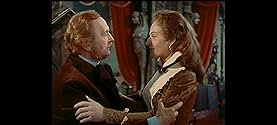Füge eine Handlung in deiner Sprache hinzuKing Ludwig II of Bavaria is frustrated, having to accept parliament's will to join Bismarck, rather he his cultured Habsburg friends, in wars. His love-life being as fruitless, he seeks com... Alles lesenKing Ludwig II of Bavaria is frustrated, having to accept parliament's will to join Bismarck, rather he his cultured Habsburg friends, in wars. His love-life being as fruitless, he seeks comfort in art. But building fairytale castles and an even grander opera for his musical idol... Alles lesenKing Ludwig II of Bavaria is frustrated, having to accept parliament's will to join Bismarck, rather he his cultured Habsburg friends, in wars. His love-life being as fruitless, he seeks comfort in art. But building fairytale castles and an even grander opera for his musical idol Wagner proves so expensive, his cabinet ends up resorting to formally challenging his men... Alles lesen
- Auszeichnungen
- 2 Gewinne & 2 Nominierungen insgesamt
- Kammerlakai
- (as Wolfried Lier)
Handlung
WUSSTEST DU SCHON:
- WissenswertesReleased the same year as Sissi (1955), which also has Empress Elisabeth aka "Sissi", who is prominently features in the movie, her sister Sophia and Sissi's husband Emperor Franz Joseph I.
- PatzerLudwig II told Otto von Bismarck that he wished they could be friends but couldn't due to different assignments. However in real life they were pen pals and wrote each other, despite only met each other once.
- VerbindungenFeatured in Klaus Kinski - Ich bin kein Schauspieler (2000)
The figure of Ludwig II together with his elaborate castles built in Bavaria is mostly associated with Luchino Visconti's 1972 masterpiece. And deservedly so because maestro's film develops the psyche of the 'fairy tale' king together with his motives for weird isolations and discoveries of his own sexuality. Thanks to its length, the use of details, music, contrasting images of white vs. black, of snow vs. darkness and the entire development of the mental states, Visconti's film remains unique and stays away from the traditional view of a feature film. Yet, fewer people know that a long time before 1972, this wondrous German film had been made, the film that still leaves a visual impression in the viewer. Although Kaeutner's film is made in the spirit of the post-war 'Heimatfilms,' the result has little to do with the saccharine sweetness that has, often undeservedly, been 'baptized' as 'kitsch.' This film still proves a certain variety of reasons why it is highly worth viewing.
The aspect that touches us most are the exquisite images, camera shots that leave more sensitive viewers breathless. Valuable cinematography by Douglas Slocombe and elaborate sets of authentic castles where the events actually took place, lavish wardrobe and bright colors make the film a visual feast. That aesthetic merit of the film is also beautifully executed in many romantic scenes that depict Ludwig's spirituality. There is also an excellent use of juxtaposing images that clearly portray the reality vs. fantasy - an aspect that played a decisive role in the king's life.
That aesthetic merit leads to the key quality of any movie...performances. O.W. Fischer, a renowned German actor of the time, does a terrific job combining a sympathetic personality with the eccentric mind, enthusiasm with isolation, link of an artist with the separation of the character. He appears to be at two levels here: as being himself, on his own and as a reflection of the love of his life - Empress Elizabeth widely known to viewers as Sissi (Ruth Leuwerik). To understand him, we are led to understand Sissi - from the very beginning, we are supplied with this perspective: two similar loving souls.
In their scenes, Ludwig's thoughts are manifested and Ludwig's feelings are conveyed. A must see is the scene at Schloss Berg, a very romantic one when they are together, their thoughts are mutual, their desires are similar and the two clouds in the sky occur to 'seal' their common mutual existence 'in Gedanken, in den Wolken' (in thoughts, in clouds). Another very symbolic scene is at the theater when they hold their hands. Of course, the performance of Ms Leuwerik is not comparable to Romy Schneider's portrayals of Sissi, but, actually, the actress offers us a very intelligent glimpse of the character - 'Kaiserin' as seen by Ludwig: through his perceptions, his dreams.
Mr Fischer as Ludwig alone gives an insightful performance. He is a man like hardly any man, a king like hardly any king who has no time for war...he wants to be alone...he loves nature...he adores beauty and art...he has his world, his passions and his idol (Richard Wagner portrayed by Paul Bildt). He is moody...he desires silence but, above all, he desires ULTIMATE FREEDOM. Insightful and psychologically claustrophobic as it may seem, the portrayal has certain limits, which makes watching the film a pleasure because the thoughts do not become too intense. We empathize with the king, we do our best to understand him and recognize something of ourselves in him. Helmut Kautner and O.W. Fischer seem to impose that limit not to make the portrayal unendurable. Another reason is the fact that difficult films were not so popular those days when the depressing images of WWII were still fresh in people.
Among the supporting cast, the actress that is a lovely discovery for me is Marianne Koch as Princess Sophie. Her portrayal shines with special charm, she is lovely as a young woman who loves Ludwig, who wants to marry him...yet, her mother's warning about true happiness in their family gives a new, unexpected standard. The turning point is the moment when she enters the theater with Ludwig and...they are alone...no audience whatsoever! The mesmerizing power that Ludwig captures while listening to Wagner's "Rheingold" occurs to be unendurable for the young princess. The music is so enchanting, so mysterious, so magical, such a blissful moment that seems to touch the very depths of human soul...yet, she cannot stand it. How memorably you can read the intense emotions from her face...tragic desire with tremendous fear. A lovely German actress whom I discovered so late thanks to my best friend.
Finally, a mention must be made of Wagner's music. Since the music had a lasting impact on the king throughout his life, we are supplied with the bits of these specific tunes that seem to touch us, overwhelm us, influence us...
13 June 1886...a new way began for the fairy tale king. No matter if we see it as an act of despair or a dream of utopia...he was a thought provoking figure. This movie is no masterpiece but an important German tribute to the unique personality. A pleasant, enjoyable aesthetic production.
- marcin_kukuczka
- 5. März 2011
- Permalink
Top-Auswahl
Details
- Erscheinungsdatum
- Herkunftsland
- Sprache
- Auch bekannt als
- Ludwig II. - Glanz und Elend eines Königs
- Drehorte
- Produktionsfirmen
- Weitere beteiligte Unternehmen bei IMDbPro anzeigen
- Laufzeit1 Stunde 55 Minuten
- Sound-Mix
- Seitenverhältnis
- 1.33 : 1
Zu dieser Seite beitragen





























